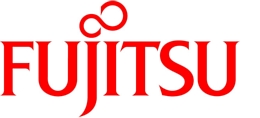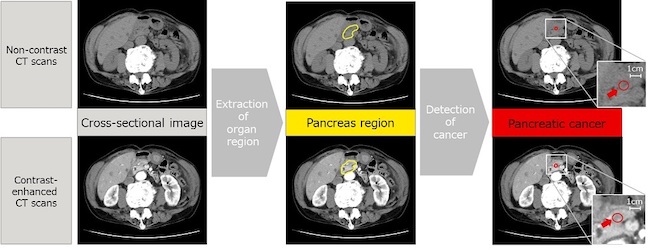
 |
The new AI technology has been trained with data from 300 anonymized CT images of pancreatic cancer patients provided by the Southern Tohoku General Hospital and offers an optimal image analysis method based on the shape of organs and cancer tumors. The joint research project represents a new approach to apply AI technology to support medical practitioners in detecting early signs of pancreatic cancer from CT scans.
Fujitsu and the Southern Tohoku General Hospital will conduct clinical trials within this joint research to further improve the newly developed AI and offer a technology for an early detection of pancreatic cancer that can help to improve the quality of life of each patient.
Background
The 5-year relative survival rate for people diagnosed with pancreatic cancer is 11%(3) which is lower in comparison to other cancer types, as it is the fastest growing type of all cancers and generally difficult to detect. As the pancreas is located in the deepest part of the human body, affected people often don't easily notice any symptoms and thus often don't undergo voluntary medical examination until the cancer progresses. The fact that the entire pancreas is hard to visualize using simple imaging tests such as abdominal ultrasonography and that affected body parts are difficult to identify makes early detection of pancreatic cancer even more difficult.
Researchers anticipate that the development of technology capable of detecting microscopic signs of cancer from imaging data and improving test capabilities will play an important role in the early detection of pancreatic cancer.
The goal of this joint research is to successfully develop an AI technology that is able to detect signs of pancreatic cancer not only from contrast-enhanced CT scans (scans using contrast agents to make organs more visible) but also from non-contrast CT scans (scans not using contrast agents) to ultimately support the early diagnosis of affected patients regardless of symptoms of pancreatic cancer.
Outline of the joint research
The precise and early detection of signs of pancreatic cancer in non-contrast CT scans represents a difficult task due to the low contrast of images and the unclear boundaries between the pancreas and other organs. To address this issue, Fujitsu and Southern Tohoku General Hospital aim to develop an AI technology that can identify the region corresponding to the pancreas (part marked yellow in figure 1) and detect the suspected parts affected by cancer (part marked red in figure 1). The technology achieves this by estimating the continuity between the anterior and posterior cross-sectional images in consideration of the anatomical tissue connection and automatically performs three-dimensional analysis including the anterior and posterior cross-sectional images in areas with strong continuity and planar analysis in areas with weak continuity.
The partners will also apply the newly developed technology in clinical practice to locate typical signs of early pancreatic cancer, including tumors and pancreatic duct dilatation that are often difficult to detect, as well as for findings that require clinical follow-up including cysts and local atrophy of the pancreas.
Future Plans
Moving forward, Southern Tohoku General Hospital and Fujitsu will continue collaboration with Fujitsu Japan and FCOM toward the realization of an AI technology for the early detection of pancreatic cancer that contributes to a higher quality of life (QOL) for affected patients. The parties will conduct further clinical verification tests as part of their joint research program with the aim to provide an improved AI technology for practical application in fiscal year 2022. Fujitsu further aims to contribute to the creation of a healthy society by applying the results of this research to a wide range of medical and health promotion services as part of its vision for "Healthy Living" under its global business brand FUJITSU Uvance.
Comment from Dr. Daizo Fukushima, Southern Tohoku General Hospital
"Previous studies at our hospital have shown that non-contrast CT scans can help to diagnose pancreatic cancer at an early stage(4). I am confident that the new AI technology can help to save many patients' lives if it is able to easily identify patients with an increased risk of pancreatic cancer."
Comment from Daiki Masumoto, Fellow, SVP, Head of Converging Technologies Laboratories, Fujitsu Research, Fujitsu Limited
"We are very pleased to announce the launch of this joint research project through FCOM, which has long supported the medical system of the Southern Tohoku General Hospital. Fujitsu will continue research and development on converging technologies(5) that combine AI-powered image analysis technology with Southern Tohoku General Hospital's medical knowledge in pancreatic cancer treatment, with the aim of establishing AI technology able to support the early detection of pancreatic cancer."
(1) Fujitsu Japan Co., Ltd.:
Head Office: Minato-ku, Tokyo; President and CEO: Takayuki Sunada
(2) FCOM CORPORATION:
Head Office: Koriyama City, Fukushima Prefecture; President and Representative Director: Masahiro Saito
(3) Survival rate for people diagnosed with pancreatic cancer is 11%:
The Japanese National Cancer Center counted and published the actual 5-year relative survival rate for people diagnosed with pancreatic cancer after diagnosis at designated hospitals all over Japan. bit.ly/3MrIHDB (in Japanese)
(4) Non-contrast CT scans can help to diagnose pancreatic cancer at an early stage:
Journal of Medical Science: Daizo Fukushima, et al., "Characteristic Radiological Features of Retrospective Diagnosed Pancreatic Cancers", Pancreas, Volume 49, Number 1, January 2020.
https://pubmed.ncbi.nlm.nih.gov/31856082/
(5) Converging technologies:
Advanced technologies that combine computer sciences and knowledge from the humanities and social sciences, aiming to solve diverse and complex issues.
About Fujitsu
Fujitsu is the leading Japanese information and communication technology (ICT) company offering a full range of technology products, solutions and services. Approximately 126,000 Fujitsu people support customers in more than 100 countries. We use our experience and the power of ICT to shape the future of society with our customers. Fujitsu Limited (TSE:6702) reported consolidated revenues of 3.6 trillion yen (US$34 billion) for the fiscal year ended March 31, 2021. For more information, please see www.fujitsu.com.
About Southern Tohoku General Hospital
Southern TOHOKU General Hospital, was opened in Koriyama, Fukushima. Since 1981, it has developed as the cutting-edge medical facility with the high skill of proton therapy and Boron Neutron Capture Therapy (BNCT). We strive to become a medical hub center in Asia and the world.
Press Contacts
Southern Tohoku General Hospital
7-115 Yatsuyamada, Koriyama, Fukushima 963-8563, Japan
FAX: +81-24-934-5527
E-mail: pr@mt.strins.or.jp
Copyright 2022 JCN Newswire. All rights reserved. www.jcnnewswire.com













